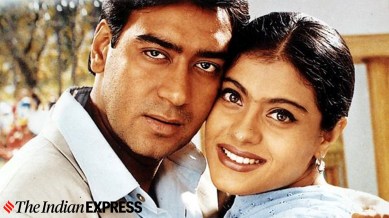📣 For more lifestyle news, click here to join our WhatsApp Channel and also follow us on Instagram
‘Acha hua 40 din ka outdoor hai…’: Kajol reflects on time apart from Ajay Devgn due to his busy schedule; how mature relationships survive long separations
She added that time and experience have helped them reach a strong level of understanding: “But we have been together for so many years and it’s a life that we have lived together.”

Kajol recently opened up about how she and her husband, actor-filmmaker Ajay Devgn, have adapted to spending time apart due to his frequent outdoor shoots. Married for 26 years, the couple has learned to balance personal priorities and professional commitments without letting them disrupt their connection.
In a conversation with Instant Bollywood, Kajol candidly shared the mixed feelings she experiences when Ajay is away for extended work schedules. “Both are good and bad. Kabhi Kabhi aisa lagta hai ki acha hua 40 din ka outdoor hai aur kabhi kabhi lagta hai he should have been at home for somethings (Sometimes I feel good that he has an outdoor shoot for 40 days but sometimes I feel he should be home).”
Hw can couples maintain emotional closeness when one partner frequently travels or works away from home for long periods?
Psychologist Rasshi Gurnani tells indianexpress.com, “When one partner frequently travels or works away for extended periods, emotional closeness can be maintained through intentional connection rituals. This could include scheduled video calls, sharing day-to-day updates, or sending voice notes — small, consistent efforts that create emotional synchrony despite the distance.”
From a psychological perspective, she adds, emotional attunement and secure attachment are critical. Couples who feel emotionally safe tend to cope better with physical absence, as their relational foundation isn’t threatened by time apart. Trust, communication, and emotional responsiveness become the glue that holds them together, even in logistical separation.
Is it healthy for couples to occasionally feel relief or even happiness when they have time apart?
Gurnani highlights, “Yes, it is completely healthy for couples to feel occasional relief or contentment when apart. This feeling often stems from a well-established interdependence, rather than unhealthy dependence. In fact, time apart can serve as a regulator, allowing for individuation, space for self-reflection, and a temporary pause from the demands of partnership.”
In psychology, she explains that this aligns with the concept of ‘differentiation’ — where both partners retain their individual identity while being
emotionally connected. Experiencing joy or peace during separation does not mean detachment; it can be a sign of a mature, resilient relationship where both individuals have learned to self-regulate without constant proximity.
Role of habit or long-term emotional adjustment play in helping couples sustain harmony in relationships
Habit and long-term emotional adjustment play a significant role in sustaining harmony in such relationships. Gurnani notes, “Over time, couples develop adaptive mechanisms, what we call relational schemas, that guide how they react to repeated situations like long work trips. This emotional muscle memory helps reduce friction and insecurity, fostering emotional predictability and a sense of normalcy.”
Long-term exposure to a lifestyle of separations often leads to greater tolerance and acceptance, minimising reactive behaviours. “When couples share a mutual understanding of each other’s roles, goals, and values, the relationship evolves from dependence to partnership, sustained by empathy, resilience, and mutual respect,” concludes the expert.
📣 For more lifestyle news, click here to join our WhatsApp Channel and also follow us on Instagram